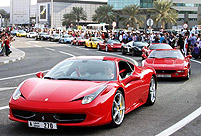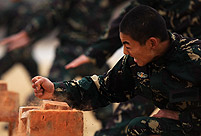The staff was unfailingly welcoming and helpful — they greet visitors from China with ni hao and demonstrate Chinese-style hospitality. Walking around the island takes about 30 minutes and you can see more than 100 villas of four different styles and sizes.
Both the island villas on the shore and water villas over the water are very clean and spacious, if you like the beaches more, the island villa is a better choice, while water villas are for those enjoy the ocean view and snorkeling.
The resort welcomes visitors from China with an array of culinary experiences. Tailored especially to the Asian palate, a vast variety of both Western and Eastern dishes are available in Coco Bodu Hithi’s five restaurants and two bars, or choose from the comprehensive in-villa dining menu.
The Maldives prioritizes environmental protection. Electricity on Coco Bodu Hithi comes from diesel-powered generators on the island, which powers a reverse-osmosis plant that desalinates water and is used throughout the resort. All villas provide information guidelines asking guests to conserve energy where possible to safeguard the environment.
Food is sourced locally when possible, such as the fish served at their restaurants being locally caught in a sustainable, traditional Maldivian way using hand-line fishing. This allows fishers to target specific species and return undersized or other species back to the ocean. The local dhonis — traditional Maldivian fishing boats — visit the resort every day delivering freshly caught reef fish and tuna.
For waste like food and drink containers, the resort has a bottle and can crushing machine that produces bales of cans and boxes of crushed glass sent to Malé for recycling overseas. Coco Bodu Hithi also is testing a food composter that reduces food waste by 90 percent and produces fantastic compost used by the resort’s orchid nursery. The orchids are used for decoration in villas, dining rooms and the like.
Besides helping protect nature, the main job for guests is to relax and enjoy the slower Maldives lifestyle.
When you’re hungry, try not to rush. When you arrive at the restaurant, the waiters will greet you politely, talk to you and share experiences. The chef will prepare delicate and amazing food that is worth the wait.
The produce, especially the vegetables, are grown in the garden on the island.
To help sustain the abundant marine life around the resorts, they also have an amicable agreement with local fishers to remain at least 200 meters offshore when fishing to avoid impacting the ecosystem near the island.
I stayed in a 188-square-meter beach house with a private swimming pool in the front garden and a private beach at the back yard.
My butler led me to the villa, helped me with my luggage, and patiently explained in English with a Maldives accent the electronic controls of every device in the house, the environmental protection cautions, and all the services I could enjoy.
He said with a shy smile that he’s learning Chinese. Then he opened a bottle of bubbly, lit a candle, prepared a bubble bath for me and left quietly.
Indulging myself in the bath while sipping the champagne with the view of the blue sky and ocean that merged on the horizon, all stresses and troubles vanished. This, I thought, is the life.
But slowing down does not mean not having fun.


 Luxury-cars parade held in Dubai
Luxury-cars parade held in Dubai Special forces take tough training sessions
Special forces take tough training sessions Fire guts 22-storey Nigeria commercial building in Lagos
Fire guts 22-storey Nigeria commercial building in Lagos Singles Day:
Singles Day:  Temperature drops dramatically in Beijing
Temperature drops dramatically in Beijing Typhoon Haiyan hits south China's Hainan
Typhoon Haiyan hits south China's Hainan Top 10 celebrity moms in China
Top 10 celebrity moms in China Weekly Sports Photos:
Weekly Sports Photos: Gingko leaves turn brilliant golden yellow in Beijing
Gingko leaves turn brilliant golden yellow in Beijing Maritime counter-terrorism drill
Maritime counter-terrorism drill Love searching stories in cities
Love searching stories in cities Male belly dancer in women’s fitness club
Male belly dancer in women’s fitness club  15 best rivers for travelers in world
15 best rivers for travelers in world National Geographic Traveler Photo Contest
National Geographic Traveler Photo Contest Weekly Sports Photos
Weekly Sports PhotosDay|Week|Month